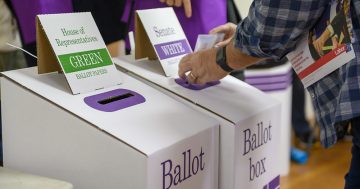
Labor leader Anthony Albanese with Kristy McBain, who has claimed the seat of Eden-Monaro following the by-election on 4 July. Photo: Anthony Albanese Twitter.
It was a curious election count watch on Saturday night (4 July) as the ABC’s Antony Green tried to make sense of the results in Eden-Monaro. The Labor vote was down, the Greens vote was down, too, but the ALP’s Kristy McBain was clearly winning by a slight, but steady, margin (and has claimed the seat).
What was happening? And why?
Political pundits have been a bit flummoxed by the results. There were not enough Green votes to be making a difference on that scale so where was the lift coming from? Certainly from the Shooters, Fishers and Farmers Party, which had been open about its intentions to preference Labor.
But while we’ll wait another fortnight to see the final numbers, it looks likely that quite a number of those preferences have also come from cranky National Party voters, and the many independents and minor party candidates.
Some of that might be attributable to the desire for revenge after John Barilaro’s quest to be the first National Party member to represent the seat flamed out spectacularly.
Barilaro has always enjoyed a high personal vote in Queanbeyan. He’s been keen to differentiate himself from what’s often seen as the disappearance of traditional Country Party values as the Nationals apparently prioritise mining interests and large-scale water extraction – issues that don’t sit well with many old-school rural voters.
While the Liberals did their best to veil the matter during the campaign, Fiona Kotvojs’s doubts about the reality of anthropogenic climate change won’t have necessarily played well with moderate voters in the electorate who have been through the summer from hell.
It’s been revealed she urged her local Eurobodalla Shire Council to enact a new rural land plan despite the NSW Rural Fire Service repeatedly voicing serious concerns the plan does not “protect life, property and the environment”.
Nearly 80 per cent of Eurobodalla’s land area was hit by bushfires that almost obliterated communities such as Mogo and Rosedale, threatened Moruya for 70 days and burnt into Batemans Bay. Two-party preferred tallies by polling place show that Kotvojs performed strongest in the Monaro, but was outpaced in Batlow and Tumbarumba – communities also hit by bushfires – and did not collect the volume of predicted Queanbeyan and Yass votes.
The Shooters, Fishers and Farmer’s tally has even been attributed to the donkey vote. Matt Stadtmiller had the good fortune to be placed first on the ballot paper, but also campaigned on sending the government a clear message about its fire and drought management.
However, it’s probable that something far more powerful than the donkey vote was at work. Rural and regional people were making up their minds based on who they trusted across party lines, rather than following how-to-vote directives issued from party HQs.
It’s clear Kristy McBain had the trust of her community before the bushfires, although Mike Kelly’s resignation had an obvious impact on ALP primary votes. But it’s just as likely that many people who voted for the Nationals or Shooters, Fishers and Farmers first are bitterly disillusioned with Scott Morrison; liked the look of a capable, politically moderate country town mayor; and were not too fussed about political allegiances.
The Nationals ran a low-key campaign with Trevor Hicks, whose job seems to have been to wave at people and collect preferences. He was defeated fairly heavily in his home booth at Captains Flat. Speculation is rife that Barilaro is warming up for another shot at the seat, come the next federal election.
Ms McBain has a lot of work ahead of her in the next two years if she is to follow in Mike Kelly’s footsteps. She told ABC news breakfast she will work across the political aisle with all constituents.
“It’s not just COVID-19, it’s the impact of bushfires and drought,” she said. “We’ve been hit particularly hard and people are looking for someone who won’t play politics and will put their needs first.”
If she does that, the lesson may well be a blindingly obvious one for power players on all sides. Country people like decent, politically moderate local MPs who understand their concerns. They generally don’t care that much about national politics and they don’t like taking orders about who they vote for.
And if they decide to trust their local member, you won’t get that representative out with dynamite.













